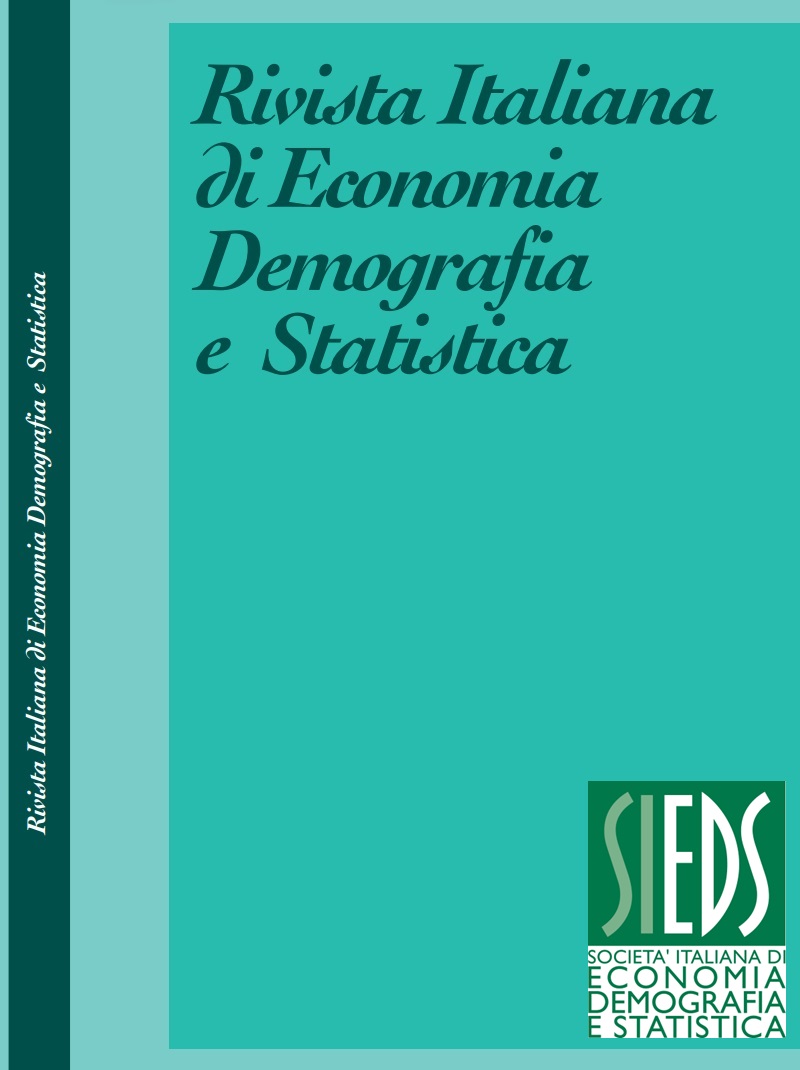Fragility and anti-fragility of Italian volunteering in the polycritical context
DOI:
https://doi.org/10.71014/sieds.v79i1.378Keywords:
Non-profit, Volunteering, Anti-fragility, ResilienceAbstract
Volunteering is a multifaceted phenomenon of great relevance to the social sciences. Several studies confirm how it significantly contributes to mitigating and partially alleviating the effects of crises (Guo et al., 2021; Della Porta, 2020) and, more generally, the distorting effects of capitalism and the market (Rago & Venturi, 2020). Despite the fact that crises increase the range of social needs to which institutional welfare alone cannot respond, it is noted that Italian volunteering has changed during the Covid pandemic, experiencing a crisis due to a reduced capacity to involve and activate individuals willing to engage in activities of general interest (Eurispes, 2022).
In 2021, there were about 360,000 non-profit institutions (NPIs) active in Italy and about 261,000 with volunteers (76.1% of the total NPIs). The aim of this paper is to describe the different forms of “organised volunteering” and to analyse specific contexts in order to identify the factors that, at territorial level, could influence the traditional way of volunteering and allow new forms of engagement and civic participation to emerge.
Specifically, we analyse the data collected by the permanent censuses of non-profit institutions in order to classify NPIs according to structural characteristics, human resources, activities carried out, and other qualitative information such as scope (mutual versus public benefit), target of mission (individuals versus community), network of stakeholders, and category of vulnerability addressed. This analysis makes it possible to identify different types of volunteering and their changes over time, providing the empirical basis for new reflections on the fragility (or not) of organised volunteering in Italy.
References
AMBROSINI M., ERMINIO D. 2020. Volontari inattesi. L’impegno sociale delle persone di origine immigrata. Trento.
BEATTON T., TORGLER B. 2018. Volunteering and life or financial shocks: does income and wealth matter?. Applied Economics, Vol. 50, No. 19, pp. 2190-2209. https://doi.org/10.1080/00036846.2017.1392003 DOI: https://doi.org/10.1080/00036846.2017.1392003
BIORCIO R., VITALE T. 2016. Italia civile: associazionismo, partecipazione e politica. Donzelli Editore.
CALTABIANO C., VITALE T., ZUCCA G. 2024. La prospettiva civica. L’Italia vista da chi si mette assieme per cambiarla. Decimo rapporto Iref sull’associazionismo sociale. Feltrinelli.
CITRONI S. 2022. L’associarsi quotidiano. Meltemi.
DELLA PORTA D. 2020. Building bridges: Social movements and civil society in times of crisis. VOLUNTAS: International Journal of Voluntary and Nonprofit Organizations, Vol. 31, No. 5, pp. 938-948. https://doi.org/10.1007/s11266-020-00199-5 DOI: https://doi.org/10.1007/s11266-020-00199-5
DUNN E. 1960. A Statistical and Analytical Technique for Regional Science. Papers, Regional Science Association, Vol. 6, pp. 97-112. DOI: https://doi.org/10.1111/j.1435-5597.1960.tb01705.x
ESTEBAN-MARQUILLAS J. 1972. A reinterpretation of shift-share analysis. Regional and Urban Economics, Vol. 2, No. 3, pp. 249-255. https://doi.org/10.1016/0034-3331(72)90033-4 DOI: https://doi.org/10.1016/0034-3331(72)90033-4
EURISPES 2022. Volontariato in pandemia. Le risposte delle organizzazioni e degli enti del Terzo Settore. https://eurispes.eu/news/volontariato-in-pandemia-le-risposte-delle-organizzazioni-e-degli-enti-del-terzo-settore/.
FIORILLO D., NAPPO N. 2015. Formal and informal volunteering and health in Mediterranean Europe. Athens Journal of Mediterranean Studies, Vol. 1, No. 4,pp. 297-309. DOI: https://doi.org/10.30958/ajms.1-4-1
GUO J., LIU N., WU Y., ZHANG, C. 2021. Why do citizens participate on government social media accounts during crises? A civic voluntarism perspective. Information & Management, Vol. 58, No. 1. https://doi.org/10.1016/j.im.2020.103286 DOI: https://doi.org/10.1016/j.im.2020.103286
LICURSI S., SABINA ET AL. 2022. Dopo la pandemia, cosa? Adattamenti e innovazioni nel volontariato organizzato in Italia. La Rivista delle Politiche Sociali, Vol. 1,pp. 57-71.
MORO G. 2022. La cittadinanza in Italia, una mappa. Carocci.
RAGO S., VENTURI P. 2020. Evoluzioni e sfide trasformative del volontariato. Bologna: Aiccon.
RANCI C. 2006. Il volontariato. Il Mulino.
TERZO G. 2021. Social capital, social economy and economic resilience of Italian provinces. Papers in Regional Science, Vol. 100, No. 5, pp. 1113-1135. https://doi.org/10.1111/pirs.12618 DOI: https://doi.org/10.1111/pirs.12618
TERZO G. 2022. Investigating the link between social cooperation sector and economic well‐being of Italian provinces through the lens of social capital. Annals of Public and Cooperative Economics, Vol. 93, No. 4, pp. 1041-1062. DOI: https://doi.org/10.1111/apce.12349
TERZO G., NOTARSTEFANO G., DI MAGGIO U. 2023. Non-profit sector and regional well-being in Italy. Regional Studies, Vol. 57, No. 3, pp. 462-477. https://doi.org/10.1080/00343404.2022.2070146 DOI: https://doi.org/10.1080/00343404.2022.2070146
TERZO, G., NOTARSTEFANO, G., DI MAGGIO, U. 2024. Strengthening local economies through social capital: The role of cooperative firms in driving economic growth in Italy. Annals of Public and Cooperative Economics, Vol. 95, No. 3, pp. 863-882. https://doi.org/10.1111/apce.12463 DOI: https://doi.org/10.1111/apce.12463
UNITED NATIONS. 2003. Handbook on Non-profit Institutions in the System of National Accounts, Studies in Methods, Series F., No. 91, New York.
WILSON J., MUSICK M. 1997. Who cares? Toward an integrated theory of volunteer work. American Sociological Review, pp. 694-713. https://doi.org/10.2307/2657355 DOI: https://doi.org/10.2307/2657355
Downloads
Published
Issue
Section
License
Copyright (c) 2025 Umberto Di Maggio, Stefania Della Queva, Manuela Nicosia, Giuseppe Notarstefano, Sabrina Stoppiello, Giuseppe Terzo

This work is licensed under a Creative Commons Attribution 4.0 International License.



